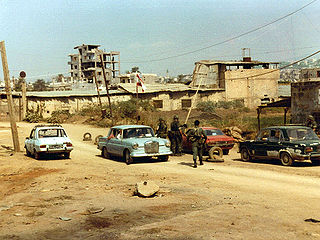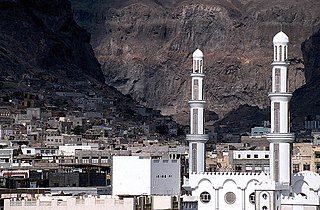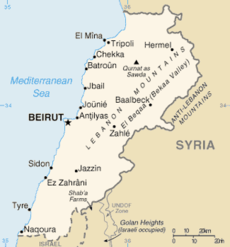
The United Nations Truce Supervision Organization (UNTSO) is an organization founded on 29 May 1948 for peacekeeping in the Middle East. Established amidst the 1948 Arab–Israeli War, its primary task was initially to provide the military command structure to the peacekeeping forces in the Middle East to enable the peacekeepers to observe and maintain the ceasefire, and in assisting the parties to the Armistice Agreements in the supervision of the application and observance of the terms of those Agreements. The organization's structure and role has evolved over time as a result of the various conflicts in the region and at times UNTSO personnel have been used to rapidly deploy to other areas of the Middle East in support of other United Nations operations. The command structure of the UNTSO was maintained to cover the later peacekeeping organisations of the United Nations Disengagement Observer Force (UNDOF) and the United Nations Interim Force in Lebanon (UNIFIL) to which UNTSO continues to provide military observers.

The Shebaa Farms, also spelled Sheba'a Farms, also known as Mount Dov, is a strip of land on the Lebanese–Syrian border that is currently occupied by Israel. Lebanon claims the Shebaa Farms as its own territory, and Syria agrees with this position. Israel claims it is part of the Golan Heights, Syrian territory that it has occupied since 1967 and effectively annexed in 1981. This dispute plays a significant role in contemporary Israel–Lebanon relations.

The Lebanese Civil War was a multifaceted armed conflict that took place from 1975 to 1990. It resulted in an estimated 150,000 fatalities and led to the exodus of almost one million people from Lebanon.

United Nations Security Council Resolution 425, adopted on 19 March 1978, five days after the Israeli invasion of Lebanon in the context of Palestinian insurgency in South Lebanon and the Lebanese Civil War, called on Israel to withdraw immediately its forces from Lebanon and established the United Nations Interim Force In Lebanon (UNIFIL). It was adopted by 12 votes to none; Czechoslovakia and the Soviet Union abstained, and China did not participate.

United Nations Security Council resolution 1559, adopted on 2 September 2004, after recalling resolutions 425 (1978), 426 (1978), 520 (1982) and 1553 (2004) on the situation in Lebanon, the Council supported free and fair presidential elections in Lebanon, urging the Lebanese government to establish control over its territory, disarm militias like Hezbollah, and facilitate the withdrawal of any remaining foreign forces from the country.

The military occupation of Lebanon by Ba'athist Syria lasted from 1976, beginning with the Syrian intervention in the Lebanese Civil War, until April 30, 2005. This period saw significant Syrian military and political influence over Lebanon, impacting its governance, economy, and society. The occupation ended following intense international pressure and the assassination of former Lebanese Prime Minister Rafic Hariri. The legacy of the occupation continues to influence Lebanese-Syrian relations and Lebanon's internal political dynamics.

The United Nations Disengagement Observer Force (UNDOF) is a United Nations peacekeeping mission tasked with maintaining the ceasefire between Israel and Syria in the aftermath of the 1973 Yom Kippur War. The mission was established by United Nations Security Council Resolution 350 on 31 May 1974, to implement Resolution 338 (1973) which called for an immediate ceasefire and implementation of United Nations Security Council Resolution 242.

United Nations Security Council Resolution 1701 is a resolution that was intended to resolve the 2006 Lebanon War. The resolution calls for a full cessation of hostilities between Israel and Hezbollah, the withdrawal of Hezbollah and other forces from Lebanon south of the Litani, the disarmament of Hezbollah and other armed groups, and the withdrawal of Israeli forces from Lebanon, with no armed forces other than UNIFIL and Lebanese military south of the Litani River, which flows about 29 km (18 mi) north of the border. It emphasizes Lebanon's need to fully exert government control and calls for efforts to address the unconditional release of abducted Israeli soldiers.

United Nations Security Council Resolution 1680, adopted on May 17, 2006, after recalling previous resolutions on Lebanon, including 425 (1978), 426 (1978), 520 (1982), 1559 (2004) and 1655 (2005), the Council strongly encouraged Syria to respond positively to Lebanon's request to delineate borders and establish diplomatic relations, with the purpose of asserting Lebanon's sovereignty, territorial integrity and political independence.

United Nations Security Council Resolution 50, adopted on May 29, 1948, called upon all governments and authorities involved in the conflict in Palestine to order a cessation of all acts of armed force of four weeks, to refrain from introducing any fighting personnel into Palestine, Egypt, Iraq, Lebanon, Saudi Arabia, Syria, Transjordan or Yemen during the cease-fire, to refrain from importing or exporting war material into or to Palestine, Egypt, Iraq, Lebanon, Saudi Arabia, Syria, Transjordan or Yemen during the cease-fire.

United Nations Security Council resolution 520, adopted unanimously on 17 September 1982, after the assassination of Lebanese President Bashir Gemayel and reaffirming resolutions 508 (1982), 509 (1982) and 516 (1982), the Council demanded that Israel withdraw immediately from Lebanon, and that Lebanese sovereignty be respected in order to restore a stable government in Lebanon.

United Nations Security Council resolution 508, adopted unanimously on 5 June 1982, after recalling previous resolutions including 425 (1978), 426 (1978) and 501 (1982), demanded an end of foreign hostilities taking place on Lebanese territory between the Palestine Liberation Organization and Israel. Israel stressed that they were upset that resolution 508 did not mention or suggest that the Palestine Liberation Organization were to blame for the attack on the Israeli ambassador.

United Nations Security Council resolution 521, adopted unanimously on 19 September 1982, after condemning the massacre of Palestinians in Beirut, Lebanon, by the Lebanese Forces militia group, the Council reaffirmed resolutions 512 (1982) and 513 (1982) which called for respect for the rights of the civilian population without any discrimination and repudiates all acts of violence against that population.

United Nations Security Council resolution 512, adopted unanimously on 19 June 1982, after recalling resolutions 508 (1982), 509 (1982) and reaffirming the Geneva Conventions, the Council reminded all parties involved in the conflict in Lebanon to respect the rights of the civilian population by allowing the free distribution of aid from United Nations agencies and the International Committee of the Red Cross.

United Nations Security Council resolution 542, adopted unanimously on 23 November 1983, after considering the situation in northern Lebanon, the Council expressed its concern at the fighting in the north of the country, deploring all loss of life.

United Nations Security Council resolution 931, adopted unanimously on 29 June 1994, after recalling Resolution 924 (1994) on the civil war in Yemen, the Council considered the findings of the fact-finding mission deployed to the country and demanded a ceasefire.

United Nations Security Council resolution 1076, adopted unanimously on 22 October 1996, after considering the situation in Afghanistan, resolutions by the General Assembly and the Joint Declaration made on 4 October 1996 by the leaders of Kazakhstan, Kyrgyzstan, Russia, Tajikistan and Uzbekistan on developments in the country, the Council discussed the deteriorating political, military and humanitarian situation in Afghanistan.

United Nations Security Council Resolution 1994, adopted unanimously on 30 June 2011, after considering a report by the Secretary-General Ban Ki-moon regarding the United Nations Disengagement Observer Force (UNDOF), the Council extended its mandate for a further six months until 31 December 2011.
















